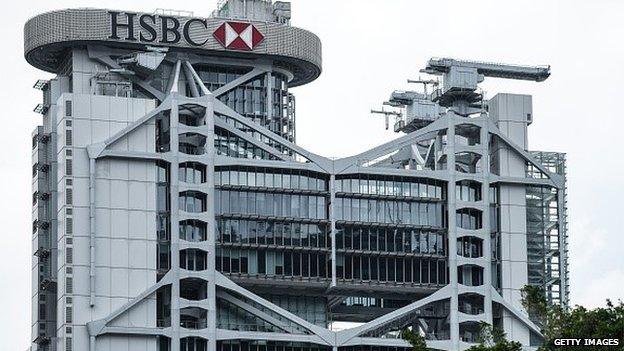Can George Osborne persuade HSBC to stay in the UK?
- Published
- comments

HSBC's headquarters in Hong Kong
HSBC's announcement on Tuesday that it is renaming its UK retail bank will do nothing to dampen speculation that it is plotting a sale of the British business.
And planning to move its global headquarters to Hong Kong.
The public reason for the rebranding is that the bank doesn't want to confuse its customers once it is obliged to operate two separate banks in the UK - a retail bank (with a new name) and an investment bank (retaining the HSBC brand).
It will be forced to split its present operations as part of the ring-fencing rules brought in by the Coalition government.
They are designed to stop banks becoming "too big to fail" and needing taxpayer support in the event of another spectacular collapse.
HSBC's chief executive, Stuart Gulliver, has said that no name has been chosen yet for the UK retail bank, although many are already speculating that the Midland brand could be resurrected.
That was the bank HSBC bought in 1992 as a way of gaining a major foothold in the UK retail market.
It also owns First Direct online bank, which could be another option for renaming the high street operation.
Whichever name it does plump for, senior banking figures say that a sale is likely to follow.
'Spin it off'
The UK retail bank could be worth as much as £20bn and produces about £1.4bn annually in adjusted pre-tax profits (that's the figure which doesn't include one-off charges).
"[There is] no point taking the cost of rebranding unless you were going to spin it off," one banking source told me. "The former leads to the latter."
It is pretty certain that any final decision will be influenced by HSBC's approach to where it is headquartered.
In today's strategy review, the bank said that it will make a decision on a possible move away from London by the end of the year.
Hong Kong seems the only plausible option for the bank's new domicile. HSBC already has a number of its business headquartered there and local regulators have said they would welcome the move.
Bank levy
Further, with today's announcement that the bank wants to "pivot" its business towards Asia - where the bank generates nearly 80% of its profits compared with a paltry 3% in Europe - it would seem a natural choice.
One big push factor is the banking levy, the UK tax that makes a hefty dent in HSBC's profitability.
Because the tax is charged on the whole balance sheet - foreign and UK - banks with major overseas businesses like HSBC are hit hardest.
Of course, moving to Hong Kong is not without risk - the politics of being under the ultimate control of China probably being the most significant.
Although HSBC has said that Britain's relationship with Europe is an issue when it comes to domicile, speaking to senior people close to HSBC it seems more likely that the levy in the UK and political risk in China will play the biggest part in making the decision.
And the Chancellor can directly influence one of those factors - tax.
Tax burden
Tomorrow is the date of the Mansion House speech - George Osborne's annual summary of financial regulation and the City.
The Chancellor could send a positive message to banks, saying that they are welcome in the UK and that regulation and the tax burden need to be "proportionate".
That could pave the way to a reform of the bank levy so that it has less of an impact on the foreign operations of UK banks. That could be announced in the Budget on 8 July.
The Chancellor could also decide not to raise the levy.
Both would be welcomed by large global banks such as HSBC.
Although, of course, critics would say that the appalling behaviour of banks over issues such as foreign exchange market manipulation means they deserve every new regulation and tax coming their way.
HSBC's decision on domicile will be a mixture of hard headed finance and politics. Over the latter, Mr Osborne holds considerable sway.